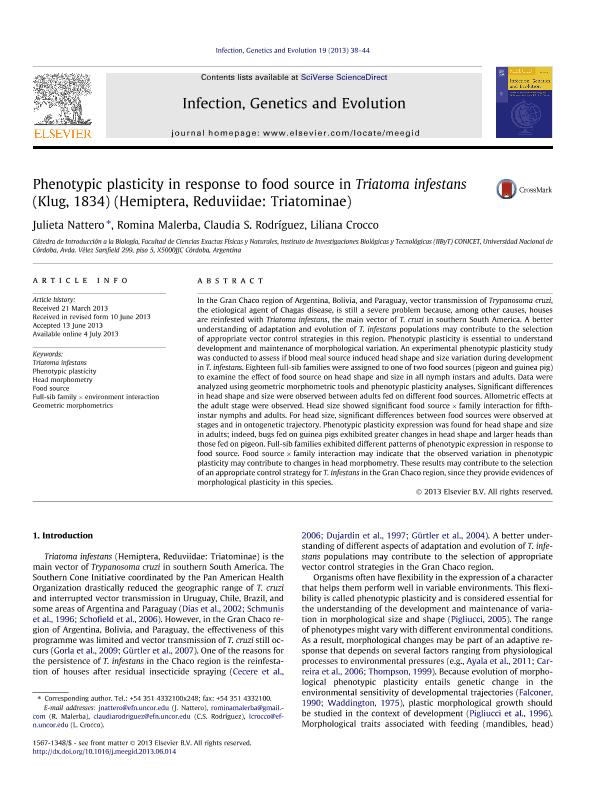Mostrar el registro sencillo del ítem
dc.contributor.author
Nattero, Julieta

dc.contributor.author
Malerba, Romina Celeste

dc.contributor.author
Rodriguez, Claudia Susana

dc.contributor.author
Crocco, Liliana Beatriz

dc.date.available
2017-09-21T20:14:36Z
dc.date.issued
2013-07
dc.identifier.citation
Nattero, Julieta; Malerba, Romina Celeste; Rodriguez, Claudia Susana; Crocco, Liliana Beatriz; Phenotypic plasticity in response to food source in Triatoma infestans (Klug, 1834) (Hemiptera, Reduviidae: Triatominae); Elsevier Science; Infection, Genetics and Evolution; 19; 7-2013; 38-44
dc.identifier.issn
1567-1348
dc.identifier.uri
http://hdl.handle.net/11336/24848
dc.description.abstract
In the Gran Chaco region of Argentina, Bolivia, and Paraguay, vector transmission of Trypanosoma cruzi, the etiological agent of Chagas disease, is still a severe problem because, among other causes, houses are reinfested with Triatoma infestans, the main vector of T. cruzi in southern South America. A better understanding of adaptation and evolution of T. infestans populations may contribute to the selection of appropriate vector control strategies in this region. Phenotypic plasticity is essential to understand development and maintenance of morphological variation. An experimental phenotypic plasticity study was conducted to assess if blood meal source induced head shape and size variation during development in T. infestans. Eighteen full-sib families were assigned to one of two food sources (pigeon and guinea pig) to examine the effect of food source on head shape and size in all nymph instars and adults. Data were analyzed using geometric morphometric tools and phenotypic plasticity analyses. Significant differences in head shape and size were observed between adults fed on different food sources. Allometric effects at the adult stage were observed. Head size showed significant food source × family interaction for fifth-instar nymphs and adults. For head size, significant differences between food sources were observed at stages and in ontogenetic trajectory. Phenotypic plasticity expression was found for head shape and size in adults; indeed, bugs fed on guinea pigs exhibited greater changes in head shape and larger heads than those fed on pigeon. Full-sib families exhibited different patterns of phenotypic expression in response to food source. Food source × family interaction may indicate that the observed variation in phenotypic plasticity may contribute to changes in head morphometry. These results may contribute to the selection of an appropriate control strategy for T. infestans in the Gran Chaco region, since they provide evidences of morphological plasticity in this species.
dc.format
application/pdf
dc.language.iso
eng
dc.publisher
Elsevier Science

dc.rights
info:eu-repo/semantics/openAccess
dc.rights.uri
https://creativecommons.org/licenses/by-nc-sa/2.5/ar/
dc.subject
Triatoma Infestans
dc.subject
Phenotipic Plasticity
dc.subject
Head Morphometry
dc.subject
Food Source
dc.subject.classification
Bioquímica y Biología Molecular

dc.subject.classification
Ciencias Biológicas

dc.subject.classification
CIENCIAS NATURALES Y EXACTAS

dc.title
Phenotypic plasticity in response to food source in Triatoma infestans (Klug, 1834) (Hemiptera, Reduviidae: Triatominae)
dc.type
info:eu-repo/semantics/article
dc.type
info:ar-repo/semantics/artículo
dc.type
info:eu-repo/semantics/publishedVersion
dc.date.updated
2017-07-05T15:01:33Z
dc.journal.volume
19
dc.journal.pagination
38-44
dc.journal.pais
Países Bajos

dc.journal.ciudad
Amsterdam
dc.description.fil
Fil: Nattero, Julieta. Consejo Nacional de Investigaciones Científicas y Técnicas. Centro Científico Tecnológico Conicet - Córdoba. Instituto de Investigaciones Biológicas y Tecnológicas. Universidad Nacional de Córdoba. Facultad de Ciencias Exactas, Físicas y Naturales. Instituto de Investigaciones Biológicas y Tecnológicas; Argentina
dc.description.fil
Fil: Malerba, Romina Celeste. Consejo Nacional de Investigaciones Científicas y Técnicas. Centro Científico Tecnológico Conicet - Córdoba. Instituto de Investigaciones Biológicas y Tecnológicas. Universidad Nacional de Córdoba. Facultad de Ciencias Exactas, Físicas y Naturales. Instituto de Investigaciones Biológicas y Tecnológicas; Argentina
dc.description.fil
Fil: Rodriguez, Claudia Susana. Consejo Nacional de Investigaciones Científicas y Técnicas. Centro Científico Tecnológico Conicet - Córdoba. Instituto de Investigaciones Biológicas y Tecnológicas. Universidad Nacional de Córdoba. Facultad de Ciencias Exactas, Físicas y Naturales. Instituto de Investigaciones Biológicas y Tecnológicas; Argentina
dc.description.fil
Fil: Crocco, Liliana Beatriz. Consejo Nacional de Investigaciones Científicas y Técnicas. Centro Científico Tecnológico Conicet - Córdoba. Instituto de Investigaciones Biológicas y Tecnológicas. Universidad Nacional de Córdoba. Facultad de Ciencias Exactas, Físicas y Naturales. Instituto de Investigaciones Biológicas y Tecnológicas; Argentina
dc.journal.title
Infection, Genetics and Evolution

dc.relation.alternativeid
info:eu-repo/semantics/altIdentifier/doi/http://dx.doi.org/10.1016/j.meegid.2013.06.014
dc.relation.alternativeid
info:eu-repo/semantics/altIdentifier/url/http://www.sciencedirect.com/science/article/pii/S1567134813002396
Archivos asociados
